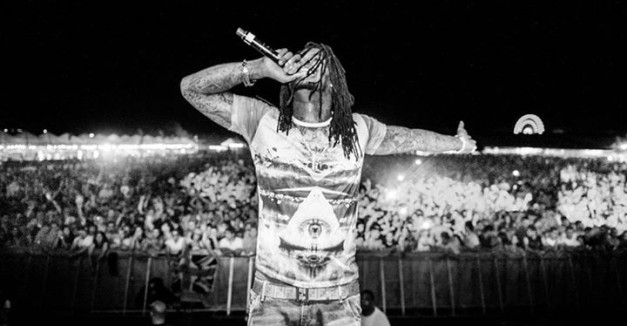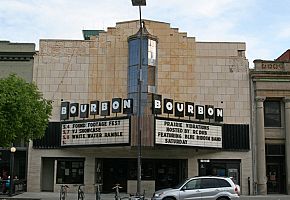Doors: 7 p.m. || Show: 8 p.m.
All Ages || $25: Advance || $60: VIP
VIP Tickets Include:
– Meet & Greet prior to show (TIME TBD)
The Bourbon Theatre presents…
::: Waka Flocka Flame :::
I never in my life wanted to rap. Let me quote that sh*t now.—Waka Flocka Flame on his 2009 debut mixtape, Salute Me or Shoot Me, Vol. 1
Waka Flocka Flame didn’t want to be a rapper when he grew up. He didn’t want to write hit songs, perform in front of thousands of people at packed clubs or hear his songs played on radio stations across the country. But more than a year after bursting onto the scene with his debut single, “O Let’s Do It,” the Atlanta rapper has managed to make more of an impact on the music industry than most rappers who have spent their entire lives trying to do it. And thanks to an influential cosign from fellow ATLien Gucci Mane, and a string of chart-topping singles, including the remix to “O Let’s Do It,” featuring Rick Ross and Diddy, and his latest hit, “Hard In Da Paint,” it doesn’t look like Waka Flocka is ready to quit rapping anytime soon.
“I never dreamed I would be doing what I’m doing today,” says Waka, who earned his unique nickname from a cousin when he was younger while they were watching an episode of Jim Henson’s classic puppet show, The Muppet Show (he later added the “Flocka Flame” to the end of it at the suggestion of Gucci Mane). “I never imagined I’d become a rapper, let alone a successful rapper.”
Born Juaquin Malphurs in Queens, N.Y., Waka Flocka certainly had all the connections to forge into music at a young age. He grew up around the corner from Murda Inc. recording artist Ja Rule, lived near LL Cool J’s grandmother and even had a cousin who used to hang around the popular group Lost Boyz in the mid-1990s. But when his mother Debra Mizay—now the CEO of artist management group Mizay Entertainment—relocated the family to Riverdale, Georgia when Waka was 11, he shied away from music and instead focused on his love for basketball. And after his youngest brother died in automobile accident when Waka was just 14, he moved even further away from it, instead opting to spend his time running the streets of Atlanta with his friends.
“That whole period of my life really messed with my head,” says Waka. “I ain’t even gonna lie—it killed me as a man. But it also made me stronger as a man in the future.”
At 18, Waka looked on as his mother began managing the career of Gucci Mane, who had established himself as a force to be reckoned with in Atlanta at the time by performing relentlessly throughout the South. Within two years, Waka began messing around with music himself alongside local producer Tay Beatz, who helped him shape his rambunctious personality on the microphone. “I was going through so much at the time,” says Waka. “I had so much stress and so many issues. I couldn’t release my emotions physically, so releasing them verbally was the only option I had.”
The result was Waka’s 2008 mixtape, Salute Me or Shoot Me, Vol. 1, featuring the trap anthem, “O Let’s Do It,” a song that caught on instantaneously in the A and quickly spread to other parts of the country. It allowed Waka to take his show on the road and also earned him a coveted slot in Gucci Mane’s 1017 Brick Squad clique. “Gucci and them were kind of shocked,” says Waka, “because nobody really knew I was rapping and then, all of a sudden, I had the biggest song in the South.”
But all the sudden success also took its toll on Waka. In January 2010, he was shot several times at a car wash in Atlanta during an alleged robbery attempt. The following month, legendary East Coast artist Method Man was doing an interview on satellite radio and spoke out against Waka, criticizing the lack of lyricism involved in crafting his style of music. He also endured a short rift in his relationship with Gucci Mane recently after the rapper parted ways with his mother’s management company in May. The incidents earned Waka a reputation as one of the most controversial artists in the industry—a reputation that he doesn’t feel he deserves.
“People have definitely gotten the wrong impression of me so far,” says Waka. “I don’t know why they think I’m so controversial. I guess people just don’t know the real me yet. It’s up to me to change their minds.”
He’s spent the better part of 2010 doing exactly that. Earlier this summer, he released “Hard In Da Paint,” a catchy Lex Luger-produced track that inspired a slew of freestyles by other artists. He also put the finishing touches on his debut album, Flockaveli—the first released through So Icey/Asylum/Warner Bros. Records. Featuring the rowdy intro, “Bustin’ At ’Em,” the strip club anthem, “No Hands,” featuring Roscoe Dash and Wale, and the brutally-honest closing track, “Fuck This Industry,” it promises to be one of the most energetic debut albums of the year.
By naming it Flockaveli, Waka—who calls 2Pac his favorite rapper of all-time—is also doing more than just being controversial for the sake of being controversial. “2Pac introduced me to a guy named Machiavelli,” says Waka. “His back was always to the wall and people threw sticks and stones at him and he had to keeping blocking them. When I recorded this album, that’s how I felt.”
And if anyone doesn’t like it? “I don’t care,” says Waka. “I’m just going to keep on making my music.”
For a guy who claims he never wanted to be a rapper, he’s certainly come around to the idea.






